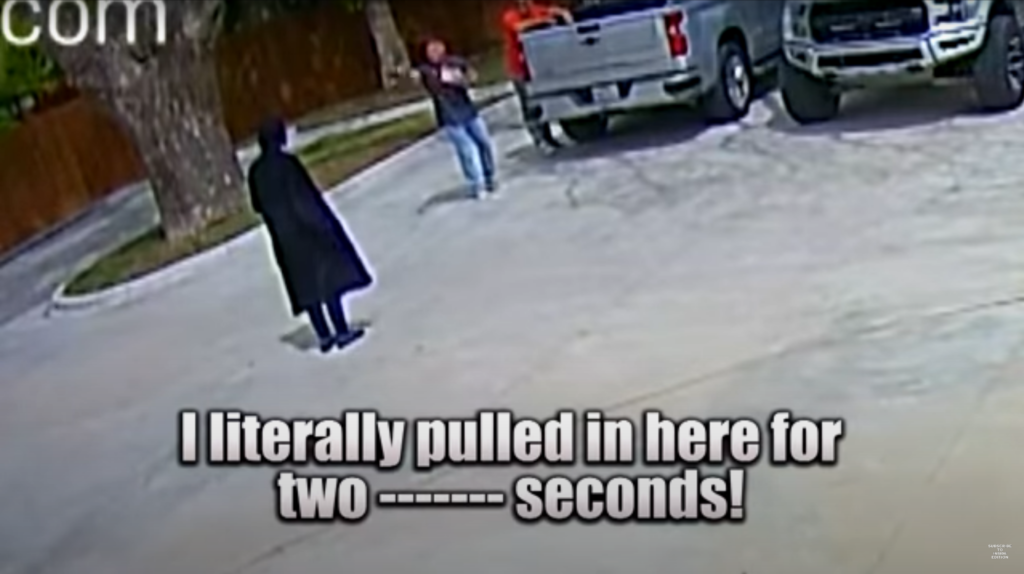
A video has been floating around this week, of a man who was shot by his neighbor in a parking lot outside their homes. He was being dropped off by a friend and coworker, who had pulled his truck into the neighbor’s assigned parking spot. As his wife came out with their newborn infant to show the baby off to the friend, he and his bathrobe-wearing neighbor got into a verbal confrontation over where the truck was parked. The neighbor shoots the man; the wife inserts herself between them; the neighbor goes back inside. We end with the man injured with a gunshot wound and the neighbor arrested (and back out on bail). There are, as always in these types of incidents, many lessons to be learned, but I want to focus on a particular one: the power of apology.
See, when the neighbor confronted the man he ended up shooting, the man responded by yelling “I literally pulled in here for two fcking seconds, calm the fck down,” punctuated with some angry gestures. It was apparently the final straw for the shooter, following on a history of other disagreements between the two. When we talk about off-ramps from violent encounters, this moment was a prime one. Imagine if the man instead responded more along the lines of “I’m sorry, we’ll be out of here in just a second.”
It might not seem fair, and it might not seem genuine. Who wants to apologize when they don’t think they’ve done something wrong? After all, the space wasn’t being used and the driver very likely didn’t intend to stay long. And how much does an apology really mean, if the person giving it doesn’t have or show remorse and won’t change their future behavior? If that’s the case, then perhaps the exercise isn’t worthwhile and the recipient shouldn’t accept it anyway. Apologies like this, if not meant with real emotion, may seem and even be entirely pro forma, simply lines in a play, recited as if they were some sort of magic spell. That doesn’t make them entirely inadequate and unacceptable, however.
Sometimes, having the words hanging out in the air are all that are needed to make an aggressive person feel heard, and that’s enough for them, at least until next time. They may just want someone to get it, to get why they’re upset and angry, to see the struggles that they’re feeling. It can be difficult when you’re feeling the same, but when you consider that your ability to empathize might mean the difference between your life and death, the effort might seem a little more critical. In the moment of argument, you can’t talk someone into or out of the idea that a particular insult calls for a violent response. You can, however, try to take back that insult or soften it a little by acknowledging that yes, you regret saying or doing something that made that person hurt. The very fact that the words of apology were said aloud can be enough, though using an obviously sarcastic or dismissive tone can backfire.
When a verbal altercation takes place in front of an audience, however small, an apology can give the other person a reason to back off. They, too, may not really want the violent outcome that you are both careening toward, but may feel they have no choice because their reputation is at risk. If you can give them a way to save face and not continue or escalate the fight, they may grab on to the opportunity to walk away. An apology can do that, as an admission to onlookers that you were wrong and the other guy was right, so they can afford to generously let you go. The end may appear reluctant and come with a parting shot, much like your awful boss telling you you’re fired after you quit, but the important part is that it’s over.
There is also a pragmatic reason for issuing as real an apology as you can. A true attempt at deescalation will, in reality and in perception, move the apologizer into the position of a defender who is not pressing the attack. When it comes to claiming self-defense and legally justifiable use of force, you will be less successful if you are the aggressor or a mutual combatant. If you can, however, articulate that you tried to end the fight, and the other person decided to get physical, then responding with a level of force corresponding to the imminent threat to your body makes more legal sense. An apology doesn’t mean you get carte blanche in the following fight, but it might help show how much you didn’t want to be in it and how your actions in the fight were necessary to your survival.
Finally, and perhaps the best reason, is that mouthing an apology can lead to actually meaning it because yeah, maybe you did do something that hurt someone. It takes empathy in order to craft a sincere apology that expresses true regret for the harm caused or the wrong done. You must think about why the other person feels injured, and find a way to tell them you’re sorry in a way they can hear and believe, and perhaps come up with a way that you can fix the problem. The exercise of coming up with apologies that might end fights before they start can help you understand where the other person is coming from, and see how you’ve arrived at a place of conflict. You might, in the process, discover you would feel similarly if you were in their shoes. If you practice the apologies that could stop situations you hear about before you’re in a real confrontation, you may then be able to avoid them entirely because you will be able to avoid offending or provoking someone into a physical attack.




